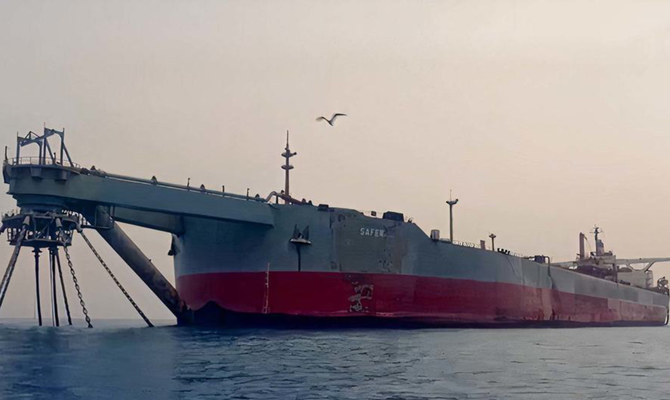NEW YORK CITY: The UN is “closer than ever” to beginning the first phase of the salvage operation on the decaying Safer oil tanker off the coast of Yemen.
However, as a result of the war in Ukraine, it has become harder and more expensive to find and hire a replacement oil tanker, posing yet another challenge for the long-delayed operation.
“Donors have generously pledged more than $84 million of the funding required for the UN-coordinated plan to prevent a major oil spill from the Safer,” UN spokesperson Farhan Haq said on Tuesday. “Additional funding from the private sector is expected soon.”
The vessel, which contains more than 1.14 million barrels of oil, has been moored in the Red Sea off the coast of Yemen for more than seven years. During that time it has had little or no maintenance and its condition has deteriorated to a point where there are growing fears of a catastrophic oil spill.
The planned salvage operation to make it safe has been split into two phases. First, the oil will be transferred from the tanker to another vessel, then moved to a permanent storage facility until the political situation in Yemen allows for it to be sold or transported elsewhere.
Haq said that with $73 million of pledges now received, the UN has been able to begin “essential preparatory work.”
“All of the technical expertise is in place to undertake the procurement for the complex operation,” he said. “This includes a marine management consultancy firm, maritime legal firm, insurance and ship brokers and oil spill experts.
“The contracting of the salvage company that will carry out the emergency operation is at an advanced stage.”
The key challenge now, Haq said, is procuring the use of a large enough oil tanker because “the UN cannot begin the emergency operation until it is certain that a safe crude carrier will be in place to take on the oil.”
However, the availability of suitable ships has decreased in the past six months and prices have doubled since the budget for the operation was prepared, “basically due to events having to do with the war in Ukraine,” he explained.
“So just as we were gearing up for operations, the cost to both lease and purchase this type of a vessel increased. So a very large crude carrier now costs at about 50 percent more than what’s budgeted in the original plan. So we have some additional expenses and it’s a little bit harder finding the right ships but we’re proceeding with the work.
“The UN is working expeditiously with a maritime broker and other partners to find a workable solution and remains confident the work can begin in the coming months.”
If the Safer breaks up and the oil spills into the Red Sea, the clean-up operation could cost an estimated $30 billion. The environmental disaster would affect not only Yemen but neighboring countries including Saudi Arabia, Djibouti, Eritrea and Somalia. In addition, fisheries would be damaged and shipping disrupted.
More than 17 countries have contributed to the funds needed for the first phase of the salvage operation, including Saudi Arabia, which donated $10 million. There have also been contributions from the private sector, public foundations and a crowdfunding campaign set up by the UN. A donation of $7 million from the Netherlands late last year brought the total up to the initial target.
The Houthis control Yemen’s western Red Sea ports, including Ras Issa, close to which the Safer is moored. The UN had been negotiating with the rebel militias for several years in an attempt to gain access to the tanker for a proper inspection. Both sides signed a memorandum of understanding in March last year, which authorized a four-month emergency operation to eliminate the immediate threat by transferring the oil to another vessel.
On Monday, France announced an additional contribution of €1 million ($1.08 million) to the UN salvage fund.
Alexandre Olmedo, deputy political coordinator of France to the UN, said he hopes the first phase of the operation can be “quickly implemented to avoid an ecological disaster.”
“We also call on the Houthis, who are currently in control of the vessel, to fully cooperate with the UN in the implementation of the rescue plan,” he said.




























